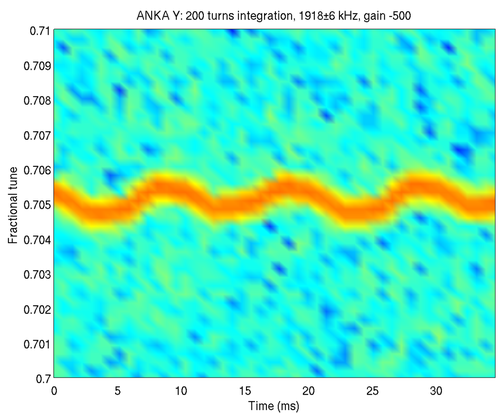Table of Contents
Tune Tracker Tests at ANKA
The most recent release of iGp12 gateware (3.12, see revision history) includes single bunch tune tracker functionality. Tune tracker can be used to continuously excite one bunch (or multiple bunches) at the tune frequency.
Theory of operation
A simplified block diagram of the tune tracker is shown below.
DDS drive generator produces sinusoidal excitation signal that is applied to the beam. Response of a single bunch is measured every turn and converted to baseband using a DDC module, followed by a CIC (cascaded integrator comb) lowpass filter. Rectangular to polar coordinate conversion produces a measurement of phase shift between the excitation applied to the beam and its response. That measurement is compared to a setpoint and then used in a feedback loop to adjust the excitation frequency so that measured phase shift matches the setpoint.
Using open-loop sweep of drive frequency setting one can determine the phase shift at the betatron or synchrotron resonance. Using that as a setpoint and closing the loop produces continuous excitation on resonance. Readout of the closed-loop drive frequency then measures the tune. Tune tracker can be configured to integrate as few as 16 turns or as many as 8×106. Integration time defines the loop processing rate and bandwidth. Longer integration improves sensitivity at the expense of tracking bandwidth.
Measurements
Fast tracking
 On June 25, 2014 tune tracker was tested at ANKA in Karlsruhe. The plot on the right shows a spectrogram of the vertical motion of a single bunch, driven by tune tracker. The tracker was configured for 200 turns of integration (13.6 kHz update rate, 6 kHz CIC bandwidth). With fast response, the loop has no problem tracking vertical tune modulation at 50 Hz.
On June 25, 2014 tune tracker was tested at ANKA in Karlsruhe. The plot on the right shows a spectrogram of the vertical motion of a single bunch, driven by tune tracker. The tracker was configured for 200 turns of integration (13.6 kHz update rate, 6 kHz CIC bandwidth). With fast response, the loop has no problem tracking vertical tune modulation at 50 Hz.